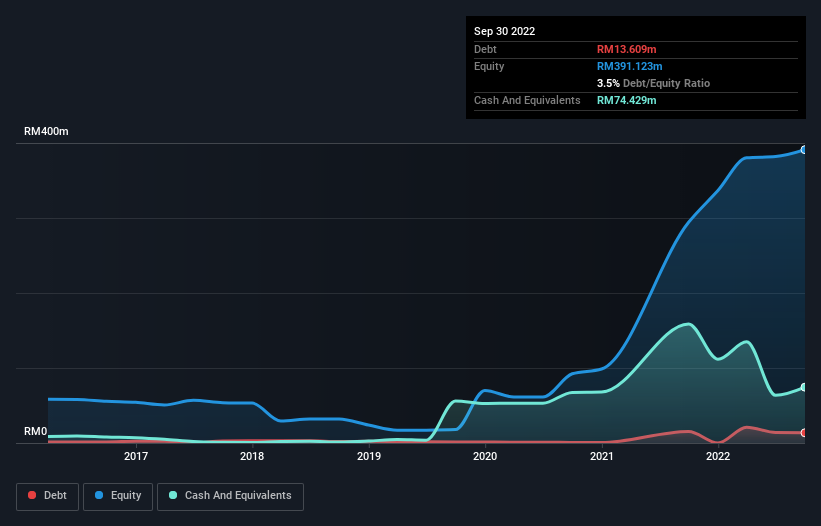- Malaysia
- /
- Healthcare Services
- /
- KLSE:HONGSENG
We Think Hong Seng Consolidated Berhad (KLSE:HONGSENG) Can Stay On Top Of Its Debt
Howard Marks put it nicely when he said that, rather than worrying about share price volatility, 'The possibility of permanent loss is the risk I worry about... and every practical investor I know worries about.' When we think about how risky a company is, we always like to look at its use of debt, since debt overload can lead to ruin. As with many other companies Hong Seng Consolidated Berhad (KLSE:HONGSENG) makes use of debt. But the real question is whether this debt is making the company risky.
Why Does Debt Bring Risk?
Debt assists a business until the business has trouble paying it off, either with new capital or with free cash flow. Part and parcel of capitalism is the process of 'creative destruction' where failed businesses are mercilessly liquidated by their bankers. However, a more usual (but still expensive) situation is where a company must dilute shareholders at a cheap share price simply to get debt under control. Of course, plenty of companies use debt to fund growth, without any negative consequences. When we examine debt levels, we first consider both cash and debt levels, together.
View our latest analysis for Hong Seng Consolidated Berhad
How Much Debt Does Hong Seng Consolidated Berhad Carry?
The image below, which you can click on for greater detail, shows that Hong Seng Consolidated Berhad had debt of RM13.6m at the end of September 2022, a reduction from RM15.3m over a year. But on the other hand it also has RM74.4m in cash, leading to a RM60.8m net cash position.

A Look At Hong Seng Consolidated Berhad's Liabilities
We can see from the most recent balance sheet that Hong Seng Consolidated Berhad had liabilities of RM27.1m falling due within a year, and liabilities of RM13.8m due beyond that. Offsetting these obligations, it had cash of RM74.4m as well as receivables valued at RM182.1m due within 12 months. So it actually has RM215.6m more liquid assets than total liabilities.
This excess liquidity suggests that Hong Seng Consolidated Berhad is taking a careful approach to debt. Because it has plenty of assets, it is unlikely to have trouble with its lenders. Simply put, the fact that Hong Seng Consolidated Berhad has more cash than debt is arguably a good indication that it can manage its debt safely.
In addition to that, we're happy to report that Hong Seng Consolidated Berhad has boosted its EBIT by 35%, thus reducing the spectre of future debt repayments. When analysing debt levels, the balance sheet is the obvious place to start. But you can't view debt in total isolation; since Hong Seng Consolidated Berhad will need earnings to service that debt. So if you're keen to discover more about its earnings, it might be worth checking out this graph of its long term earnings trend.
Finally, a business needs free cash flow to pay off debt; accounting profits just don't cut it. While Hong Seng Consolidated Berhad has net cash on its balance sheet, it's still worth taking a look at its ability to convert earnings before interest and tax (EBIT) to free cash flow, to help us understand how quickly it is building (or eroding) that cash balance. During the last two years, Hong Seng Consolidated Berhad burned a lot of cash. While that may be a result of expenditure for growth, it does make the debt far more risky.
Summing Up
While it is always sensible to investigate a company's debt, in this case Hong Seng Consolidated Berhad has RM60.8m in net cash and a decent-looking balance sheet. And we liked the look of last year's 35% year-on-year EBIT growth. So is Hong Seng Consolidated Berhad's debt a risk? It doesn't seem so to us. When analysing debt levels, the balance sheet is the obvious place to start. However, not all investment risk resides within the balance sheet - far from it. For example, we've discovered 2 warning signs for Hong Seng Consolidated Berhad (1 is a bit unpleasant!) that you should be aware of before investing here.
When all is said and done, sometimes its easier to focus on companies that don't even need debt. Readers can access a list of growth stocks with zero net debt 100% free, right now.
Valuation is complex, but we're here to simplify it.
Discover if Hong Seng Consolidated Berhad might be undervalued or overvalued with our detailed analysis, featuring fair value estimates, potential risks, dividends, insider trades, and its financial condition.
Access Free AnalysisHave feedback on this article? Concerned about the content? Get in touch with us directly. Alternatively, email editorial-team (at) simplywallst.com.
This article by Simply Wall St is general in nature. We provide commentary based on historical data and analyst forecasts only using an unbiased methodology and our articles are not intended to be financial advice. It does not constitute a recommendation to buy or sell any stock, and does not take account of your objectives, or your financial situation. We aim to bring you long-term focused analysis driven by fundamental data. Note that our analysis may not factor in the latest price-sensitive company announcements or qualitative material. Simply Wall St has no position in any stocks mentioned.
About KLSE:HONGSENG
Hong Seng Consolidated Berhad
An investment holding company, engages in gloves and NBL manufacturing, healthcare, and financial services in Malaysia and Australia.
Adequate balance sheet and fair value.
Market Insights
Community Narratives




